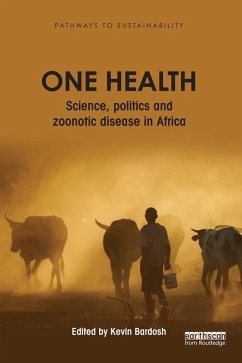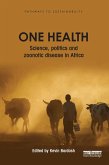Dieser Download kann aus rechtlichen Gründen nur mit Rechnungsadresse in A, B, BG, CY, CZ, D, DK, EW, E, FIN, F, GR, HR, H, IRL, I, LT, L, LR, M, NL, PL, P, R, S, SLO, SK ausgeliefert werden.
"In principle, One Health champions an ecological agenda that counterbalances a top heavy and well-funded biosecurity agenda driven by fear. One Health is directed toward gaining the trust of populations whose livelihood depends on the health of their animals, creating partnerships, and winning the peace as distinct from preparing for wars against (re)emerging diseases. This book is timely and evocative. The authors move beyond One Health rhetoric and call for a critical and realistic assessment of what One Health can become given the complex world of biopolitics, special interest groups, funding flows, professional hierarchies, power relations and the politics of governance." - Mark Nichter, University of Arizona, USA
"This book makes a significant contribution to the One Health movement by showing the added value of the social sciences in advancing closer cooperation between human and animal health in Africa. It nicely shows the need to understand both zoonoses and health as an outcome of complex social-ecological systems, and the importance of political analysis for lasting solutions." - Jakob Zinsstag, Human and Animal Health Research Unit, Swiss TPH, Switzerland
"Since humans domesticated themselves and animals in the Neolithic, plagues of people and animals have been a recurring phenomenon. Plagues are tail events: the low probability of a given plague, the high potential impact, and the dread associated with novel disease means plagues cannot be simply dealt with as medical events. This book brings political and social analysis to shed light on current and coming plagues." - Delia Grace, International Livestock Research Institute, Kenya
"In this insightful critique, Bardosh and colleagues show how politics, economics, and rhetoric intersect in the "One Health" movement. They argue powerfully that socio-political forces have shaped research and policy on zoonoses, and that acknowledging this reality will inspire more effective, respectful, and lasting solutions in Africa and beyond." - Tony L. Goldberg, University of Wisconsin-Madison, USA
"In a captivating narrative, Bardosh and others broaden the horizon of One Health by exploring the political economy of emerging and endemic zoonotic disease research and policy development, and by bridging bio- and social science realms. A must read for all present and future One Health practitioners!" - Katinka de Balogh, Food and Agriculture Organization of the United Nations, Italy
"This book on One Health examines how power and politics are interwoven into science and policy. It reveals how One Health - if grounded in an understanding of the complex social relationships that pervade our world - can build resilient and effective systems that sustain healthier people, animals, and ecologies into the future. The case studies give practical advice on how to break down institutional and disciplinary silos in building a more resilient global society. It is social and political analysis at its best!" - Paul Gibbs, University of Florida, USA
"Policy direction is at the heart of many disease problems in Africa. This book provides a thorough and honest analysis of the issues in using a One Health approach to harmonize different policy direction in solving health problems. It helps bridge the gap between biomedical and social scientists, and provides conceptual light on how to advance better control or eradication program implementation." - Charles Waiswa, Makerere University, Uganda
"Alongside compelling case studies, this book provides conceptual and practical evidence on the need to understand the interplay between political, social and environmental determinants for zoonotic disease. As the authors make clear, doing so can help us overcome the challenges of effective research and policy implementation, while placing health equity, sustainability and the needs of the poor at the heart of global health." - Johannes Sommerfeld, Special Programme for Research and Training in Tropical Diseases (TDR), Switzerland
As stated by the Centers for Disease Control and Prevention, One Health is the concept that human health is directly linked to the health of animals and the environment. Thus, collaborative approaches among veterinarians, ecologists, physicians, and public health practitioners are needed to address public health threats. In this volume, the editor provides a comprehensive background for the development and evolution of collaborative approaches to managing disease outbreaks. However, instead of focusing on the development and success of the One Health approach, contributing authors provide evidence of disconnects among policy makers, scientists, and people affected by disease. Therefore, the contributors often argue for an expanded role of political and social scientists in the One Health narrative. The book tends to use terminology typical of health practitioners and ecological professionals. This deems the work appropriate for advanced undergraduate students, graduate students, researchers, and health professionals working in or interested in disease outbreaks and public health issues and the social and political implications for control of disease.
--K. R. Thompson, Missouri State University , December 2016 issue of CHOICE









